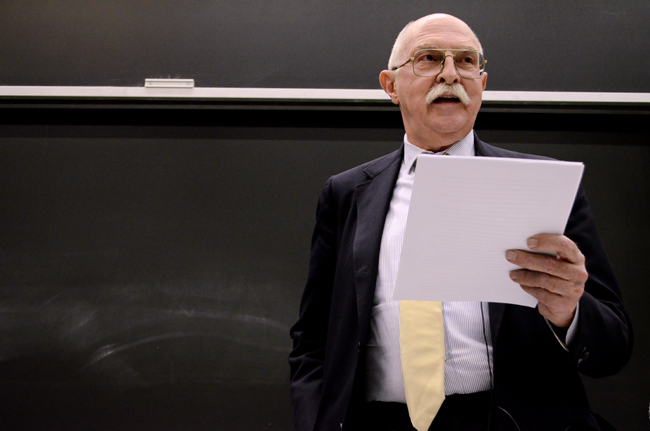Technological development and the weakening of the middle class will lead to the demise of capitalism by the year 2045, said Randall Collins, sociology professor at University of Pennsylvania.
In a lecture on campus Friday, Collins said capitalism has historically used five “escapes” — new technology, globalization, financial industry expansion, government investment and educational credential inflation — to prevent the collapse of the system. These escapes are no longer viable, he said.
“Capitalism depends on having an income-earning population that can buy its products,” said Collins. “Displacement of workers by machinery is the formula for the self-destruction of capitalism.”
Higher levels of educational attainment will no longer serve an as “escape” because the marketability of a particular educational certificate in a job market declines when more people obtain them, Collins said.
“In the U.S., the high school diploma was comparatively rare before World War II. Now high school degrees are so commonplace that their job value is worthless,” Collins said. “University attendance is now over 60 percent of the youth core and is now on the way to the same fate as the high school degree.”
According to Collins, this phenomenon could become an endless cycle, as workers seek further education as “the best response” to the diminishing value of their previous degrees.
Collins said educated workers from other countries who are willing to work online are another factor increasing the competition for middle class jobs in the U.S.
“The Internet creates a much wider pool of workers who can access available jobs, especially if they do not have to move to a distant place of work,” Collins said.
Sociology associate professor Alexander Weinreb disagreed with Collins’ theory of the collapse of capitalism because it “glosses over” cultural and national economic diversity.
“Capitalism may look different in 30 years, but it ain’t gonna be dead, and it ain’t gonna smell funny,” Weinreb said.
Government professor David Edwards also said the current “anti-government” political culture seems to undermine Collins’ theory because it does not allow for a strong public sector to form after the private sector collapses.
“Most of what [he] said about the possible way out of this depends on a dramatic growth in the role of government. But what’s most striking about discourse today is the strength of the anti-government movement, which has infected some of the left, as well as most of the right,” Edwards said.





















